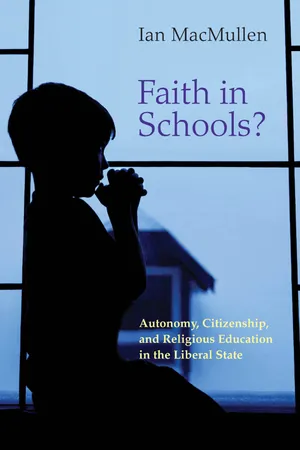
Faith in Schools?
Autonomy, Citizenship, and Religious Education in the Liberal State
- 240 pages
- English
- ePUB (mobile friendly)
- Available on iOS & Android
About This Book
Should a liberal democratic state permit religious schools? Should it fund them? What principles should govern these decisions in a society marked by religious and cultural pluralism? In Faith in Schools?, Ian MacMullen tackles these important questions through both political and educational theory, and he reaches some surprising and provocative conclusions.
MacMullen argues that parents' desires to educate their children "in the faith" must not be allowed to deny children the opportunity for ongoing rational reflection about their values. Government should safeguard children's interests in developing as autonomous persons as well as society's interest in the education of an emerging generation of citizens. But, he writes, liberal theory does not support a strict separation of church and state in education policy.
MacMullen proposes criteria to distinguish religious schools that satisfy legitimate public interests from those that do not. And he argues forcefully that governments should fund every type of school that they permit, rather than favoring upper-income parents by allowing them to buy their way out of the requirements deemed suitable for children educated at public expense. Drawing on psychological research, he proposes public funding of a broad range of religious primary schools, because they can help lay the foundations for young children's future autonomy. In secondary education, by contrast, even private religious schools ought to be obliged to provide robust exposure to the ideas of other religions, to atheism, and to nonreligious approaches to ethics.
Frequently asked questions
Information
Table of contents
- Table of Contents
- ACKNOWLEDGMENTS
- Introduction
- PART I Civic Education and Religious Schools
- Chapter 1 The Civic Case against Religious Schools
- Chapter 2 Civic Education and the Autonomy Problem in Political Liberalism
- PART II Autonomy as a Public Value
- Chapter 3
- Chapter 4 The Value of Autonomy in a Pluralist World
- Chapter 5 Autonomy as a Goal of Education Policy: Objections and Responses
- PART III Religious Schools and Education for Autonomy
- Chapter 6 Secular Public Schools: Critiques and Responses
- Chapter 7 Religious Secondary Schools as Threat to Autonomy?
- Chapter 8 The Role of Religious Primary Schools
- Conclusion
- BIBLIOGRAPHY